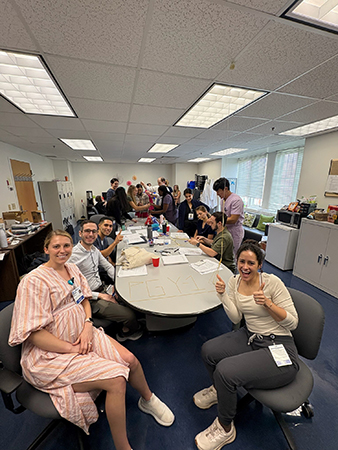We have a state-of-the-art standard three-year dermatology training program, and also offer three enhanced academic opportunities including a 2+2 Research Position (applied to through the ERAS/NRMP), a Clinical Educator Track (available to any resident of our program regardless of position into which they match), and a Health Disparities and Community Engagement Position (applied to through ERAS/NRMP).
2+2 Research Position (1529080A3)
Duke Dermatology will not offer a 2+2 Research Position in the 2025-2026 Application Year
The Duke Department of Dermatology has a special interest in developing outstanding physician-scientists in clinical, translational, and basic science research. Applicants with a strong interest in pursuing a career dedicated to basic or translational research should apply to our 2+2 Research position through ERAS (Duke Dermatology Research position). This position is designed to help trainees get an early start on their scientific training by replacing some of their clinical work with postdoctoral laboratory work. Residents will confirm their commitment to this position by March 1st of their first year of dermatology training.

The Duke University System is an ideal environment to develop a research career. It is home to numerous renowned clinical and basic science researchers and hosts a wide array of outstanding research programs, basic science laboratories, and more than 30 state-of-the-art shared research core facilities. Duke has joined a national initiative to develop physician-scientists and has opened a new office for physician-scientist development. This office will integrate and streamline many of Duke’s best resources for physician-scientists and will offer formalized courses and mentorship resources. Please click here for more information about this initiative. Mentors may be chosen from within or outside the Dermatology Department, and collaboration with the other basic science or clinical departments is encouraged.
Each position will be individualized and will be designed by a committee consisting of the resident, the research mentor, and residency program and departmental leadership. The resident’s first year of dermatology training will be clinical and the remaining years will be individualized to each participant to meet their research goals and the requirements of the ABD. Residents in this position must complete at least 27 months of clinical training.
Residents will be expected to participate in the Society for Investigative Dermatology (SID) Annual meeting, and/or other scientific meetings relevant to their field of study, as well as generate research papers and abstracts. Intensive mentorship, career advice, and didactic training, including the option to participate in the NIH-Duke Clinical Research Training Program, will be available. Training and mentorship in scientific writing and grant-writing will also be provided. It is our hope that this position will prepare the resident to gradually transition into a successful, independent, physician-scientist.
Clinician Educator Track
Residents who are in good standing may apply to participate in our clinician educator track. Residents interested in pursuing this specialized track should declare their interest during their first or early second year of dermatology training. The Duke Department of Dermatology has a special interest in developing academic dermatologists and in encouraging our residents to pursue careers as clinician educators and researchers.

The clinician educator track prepares our residents to attain positions in academia such as residency program directors and clinician educators. It focuses on providing a solid foundation in teaching, administration, clinical dermatology, and clinical research. Each track is individualized and will be designed by a committee consisting of the resident, a faculty mentor, the residency program director, and the department chair. Residents who pursue this track will be provided with close mentorship to aid in their career development.
At Duke, we have ample opportunities available for residents who strive to become clinician educators and academic dermatologists. Examples of options that may be incorporated into an individual’s training plan include:
- Specialty clinics to develop an academic niche
- Elective time to develop an academic niche
- Participation in clinical research
- Publication of dermatology case reports, case series, reviews, and original research on the local, regional and national level
- Poster and oral presentations at the local, regional and national level
- Course and conference participation relevant to career development at Duke and beyond (Feagin leadership scholars, Dermatology Teachers Exchange Group, SID leadership seminar, ACGME conferences, clinical epidemiology, statistics)
- Participation in dermatology and medical education committees on the local, regional and national level
- Clinical teaching of medical students and primary care residents
- Medical student and primary care resident dermatology curriculum design and administration
- Medical student and primary care lectures (outside of our department)
- Other great ideas will be considered
We are very excited about our clinician educator track. This program is individualized to allow trainees to pursue their own specialized interests and build the strong foundation that they need to become successful clinician educators and academic dermatologists.
Health Disparities and Community Engagement Position (1529080A2)
The Duke Dermatology Health Disparities and Community Engagement residency position is offered to one residency applicant per year. No additional application information is required to apply for our Health Disparities and Community Engagement residency position, but please be sure to highlight your past accomplishments in these areas in your personal statement. We are interested to hear about your personal goals as they pertain to health disparities and community engagement within the field of Dermatology. See below for Eligible Candidate Characteristics.
Background:
Developing a dermatology workforce versed in the skills to support patients of multicultural and various socioeconomic backgrounds is a nationwide goal and a challenge. Our specialty needs dermatologists with these skills and relevant experiences to improve the quality and quantity of clinical and research projects focused on all populations, to improve medical education, and to foster better understanding and health of the rich cultural community in which we live and work.
Goals:
- Increase awareness of issues related to underserved and under-represented populations in our community, social determinants of health, and to increase dermatologic care for these populations
- Increase availability of training opportunities for dermatology residents in the needs of underserved and under-represented populations, the methods for enhancing care of these populations, and to encourage academic investigation into these issues

Eligible candidate characteristics include:
- Demonstration of interest and engagement in activities aimed at research, educational program development, leadership roles, and/or community engagement specific to health disparities, advocacy and/or community interactions during their educational career
- Demonstration of a commitment to serving populations of all backgrounds and needs in the clinical or medical education setting, research arena, and/or local community after residency
Program characteristics:
- Residents in this position will participate in all aspects of the Duke Dermatology residency training program as currently approved by ACGME
- Educational content focused on health disparities, community engagement, and social determinants of health, is developed for all dermatology residents and is part of our standard dermatology curriculum
- Residents with interest in multicultural populations, health disparities, and community engagement will be encouraged and supported to complete electives and design individual projects in areas directly related to their interests in these realms
- While the Health Disparities and Community Engagement-designated resident is supported and encouraged to develop focused interest in health disparities-related activities, there are no additional responsibilities or expectations beyond those within the general residency track